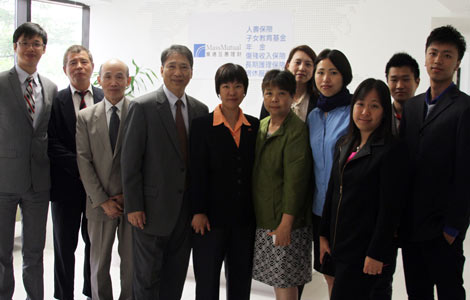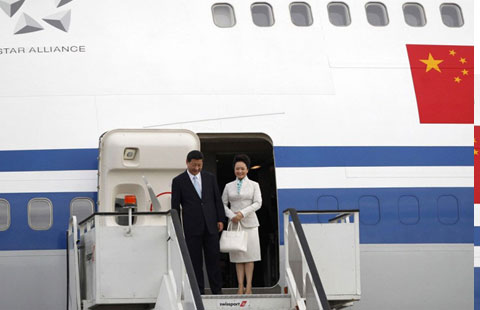China Argentina sign deal on dams
Updated: 2014-07-19 22:14
By WU JIAO in Buenos Aires and ZHAO SHENGNAN in Beijing (China Daily USA)
|
||||||||
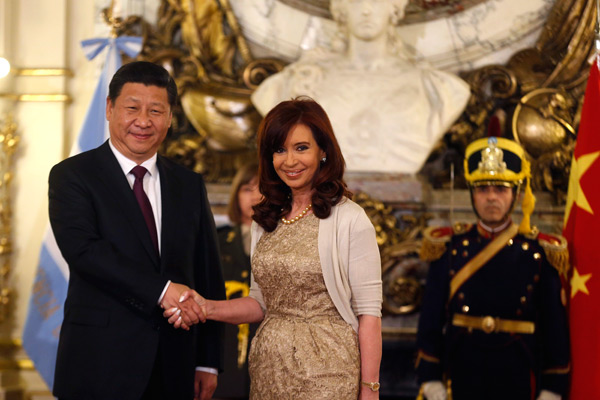 |
|
Chinese President Xi Jinping (L) and Argentine President Cristina Fernandez de Kirchner (R) shake hands during an official welcome ceremony at the Casa Rosada government palace in Buenos Aires July 18, 2014.[Photo/Agencies] |
China and Argentina energized their partnership Friday by inking long-awaited financing agreements for the construction of two hydroelectric dams and a railway project in Argentina worth around $6.8 billion to help improve Argentina's bottlenecked infrastructure sector.
The accords are part of the series of economic and technology cooperation accords in the sectors of agricultural, energy, nuclear power exceeding $10 billion signed during President Xi Jinping's first-ever state visit to the South American country, which is to last from Friday to Sunday.
Throwing a lavish welcoming ceremony for Xi, Argentina President Cristina Fernández welcomed Xi with horse guards and military band on Friday afternoon.
It is the first visit by a Chinese president to Argentina in 10 years. China now stands as the No 2 trading partner with Argentina, and Argentina's major agricultural commodity importer.
The two presidents witnessed through video screen the launch ceremony of two hydroelectric dams which will be built by China Gezhouba Group Co Ltd, the firm that built the Three Gorges Dam, in collaboration with a local firm.
Part of the hydroelectric projects will be financed by the China Development Bank and Industrial and Commercial Bank of China.
The hydroelectric projects in the sparsely populated Patagonia province of Santa Cruz is expected to generate a combined capacity of 1,740 megawatts. It has been reported that their power generation will account for about 10 percent of Argentina's energy demands.
The Argentine government said last year that the dams will help curb Argentina's need to import diesel and liquefied natural gas and save about $11 billion a year. More accessible energy supplies will help the province's economy attract greater investment, officials in Santa Cruz said.
The agreements also include a plan to revive a $10 billion currency swap with China. It would enable China to trade with Argentina in renminbi, taking pressure off shortages of dollars in Buenos Aires as it remains unable to borrow abroad until the holdouts issue is resolved.
In a joint press conference, Xi said the accords signed Friday will "greatly enhance the cooperation between the two countries".
As infrastructure is an important sector in bilateral cooperation, China supports more Chinese infrastructure companies taking part in Argentine projects, said Xi.
Argentina President Cristina Fernández said that the dam and railway projects can help save the cost of transportation and logistics and promote Argentina's economic development. "I think China and Argentina has embarked on a new stage of strategic relationship," she said.
Observers said the infrastructure projects would strengthen China's status as Argentina’s top trade partner, especially the main destination for its abundant grain exports.
Those deals also open the door to more Chinese construction companies and investment to the resource-rich country that has made boosting its limited infrastructure a priority, said observers.
Zhang Yong, a researcher in Latin American studies at the Chinese Academy of Social Sciences, said Argentina is keen for greater cooperation with China, especially in infrastructure that has been a bottleneck for its economy.
The hydroelectric projects will allow Argentina to realize the goal of developing sustainable energy while China will provide attractive financial and labor support, said Zhang.
Xu Yicong, former Chinese ambassador to Argentina, said China's know-how could boost China's exports to Argentina and help the country improve living standards and vitalize the southern half of Argentina.
China will also be able to share its experiences in major projects with Argentina, which is good at building hydroelectric equipment, Xu added.
Hydroelectric dams currently account for about 30 percent of the power generated in Argentina and plans for 10 more have been drawn up.
Highlighting the complementariness between the two economies, Yin Hengmin, China's Ambassador to Argentina, called for increased trade in high added value products and cooperation in the design and production of high-tech products.
Bilateral trade reached $14.84 billion in 2013, up 2.8 percent from a year earlier.
China is Argentina's second-largest trade partner, and the leading destination for agro-product exports. It is also the third-largest source of investment, while Argentina is China's fifth-largest trade partner in Latin America and third-largest source of agro-product imports.
Contact the writers at wujiao@chinadaily.com.cn zhaoshengnan@chinadaily.com.cn.

 China Argentina sign deal on dams
China Argentina sign deal on dams
 Tango builds bridge to China
Tango builds bridge to China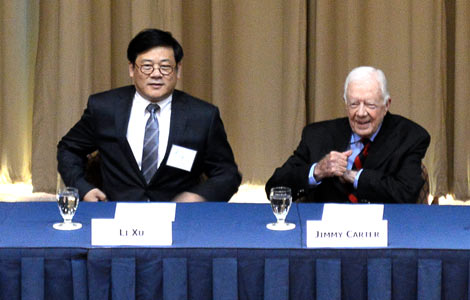
 Ex-President Carter lauds US-China relations
Ex-President Carter lauds US-China relations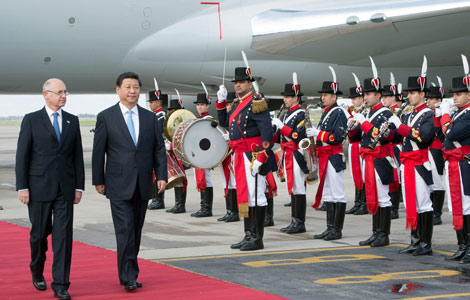
 Chinese president arrives in Argentina for state visit
Chinese president arrives in Argentina for state visit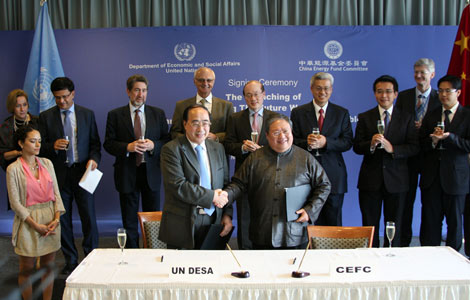
 Powering the future
Powering the future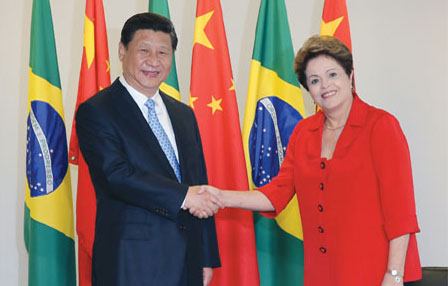
 China, Brazil strengthen close ties
China, Brazil strengthen close ties
 Closer ties between China, US start with students
Closer ties between China, US start with students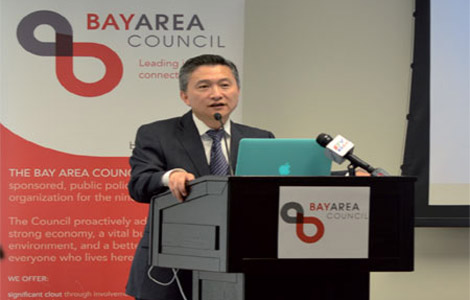
 Chinese banking delegation visits Bay Area
Chinese banking delegation visits Bay Area
Most Viewed
Editor's Picks

|

|

|

|

|

|
Today's Top News
China 'shocked' at Malaysian plane crash
Portuguese Baidu launched
Security system showcased at BRICS summit
China helping Brazil tap into its own energy
Malaysian airliner downed in Ukraine, 295 dead
Xi promotes cooperation on railway across South America
China urges U.S. not to abuse trade system
Couple's $15m to Harvard starts $100m fund for needy
US Weekly

|

|

